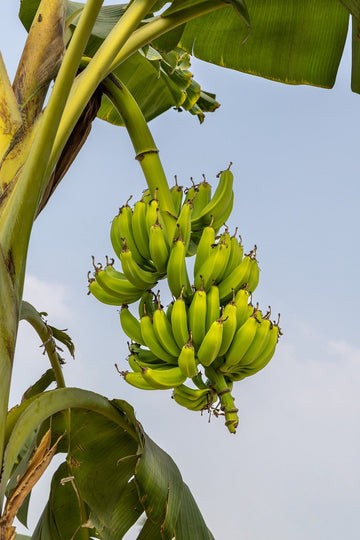Botanical Name: Musa spp.
Type of Plant: Herbaceous perennial plant
Part of the Plant used: Fruit, leaves, flower
Description: Banana, belonging to the Musa genus, encompasses several species of herbaceous perennial plants cultivated for their elongated, edible fruits. Bananas are native to tropical and subtropical regions and are grown worldwide for their nutritional value, versatility, and culinary uses. The fruit of the banana plant is typically elongated, curved, and varies in color from yellow to green, red, or even purple, depending on the variety. Bananas are consumed when ripe and have a soft, creamy texture and sweet flavor. Banana leaves are also utilized for various purposes, such as wrapping food, serving as plates, or for decorative and ceremonial purposes.
Benefits:
- Culinary Uses: Bananas are one of the most versatile fruits used in diverse culinary preparations. They can be enjoyed fresh as a healthy snack, added to breakfast dishes such as cereals, oatmeal, and pancakes, or blended into smoothies and shakes. Bananas are also used in baking, where they add moisture, sweetness, and flavor to cakes, muffins, bread, and desserts. In some cuisines, ripe bananas are cooked and served as a dessert or used to make savory dishes.
- Nutritional Value: Bananas are nutrient-dense fruits packed with essential vitamins, minerals, and dietary fiber. They are an excellent source of potassium, vitamin C, vitamin B6, and manganese, as well as providing moderate amounts of other vitamins and minerals. Bananas are low in fat and cholesterol-free, making them a healthy choice for people of all ages. Consuming bananas may support heart health, digestive health, and overall well-being.
- Health Benefits: Bananas offer numerous health benefits due to their unique nutritional profile and bioactive compounds. They are rich in antioxidants, such as vitamin C and dopamine, which help neutralize free radicals and reduce oxidative stress in the body. Bananas also contain dietary fiber, which promotes digestive health and regulates bowel movements. The potassium in bananas helps maintain fluid balance, electrolyte levels, and blood pressure, reducing the risk of hypertension and stroke.
Cultivation:
Growing Conditions:
- Sunlight: Banana plants thrive in full sunlight but can tolerate partial shade, especially in hot climates. Ensure they receive at least 6 to 8 hours of direct sunlight daily for optimal growth and fruit production.
- Soil: Well-draining, fertile soil with a pH level between 5.5 and 7.0 is ideal for banana cultivation. Sandy loam or loamy soil enriched with organic matter promotes healthy root development and vigorous growth. Bananas are sensitive to waterlogging and prefer soil that retains moisture without becoming waterlogged.
- Water: Keep the soil consistently moist throughout the growing season, especially during flowering and fruiting stages. Banana plants have high water requirements and may suffer from stress if soil moisture is inadequate. Water regularly, especially during dry periods, and mulch around the base of the plant to retain soil moisture and suppress weed growth.
- Climate: Bananas thrive in warm, tropical and subtropical climates with temperatures between 20°C to 30°C (68°F to 86°F). They require high humidity and rainfall for optimal growth and fruit production. Bananas are commonly grown as perennials in regions with a long growing season and as annuals in cooler climates.
Harvesting and Storage of Banana:
- Harvest bananas when they reach full maturity and ripeness, typically within 3 to 6 months after flowering. Ripe bananas can be identified by their yellow color, slightly soft texture, and sweet aroma. Use a sharp knife or machete to cut the banana bunch from the plant, leaving a short stem attached.
- Once harvested, bananas can be stored at room temperature for several days to ripen further. To slow down the ripening process, store bananas in a cool, dry place away from direct sunlight. Avoid refrigerating unripe bananas, as this can cause them to turn black and affect their flavor and texture.
- Ripe bananas can be stored in the refrigerator for up to a week to extend their shelf life. Store ripe bananas in a perforated plastic bag or airtight container to prevent them from absorbing odors and moisture. Use ripe bananas promptly in cooking, baking, or as a healthy snack to enjoy their flavor and nutritional benefits.


